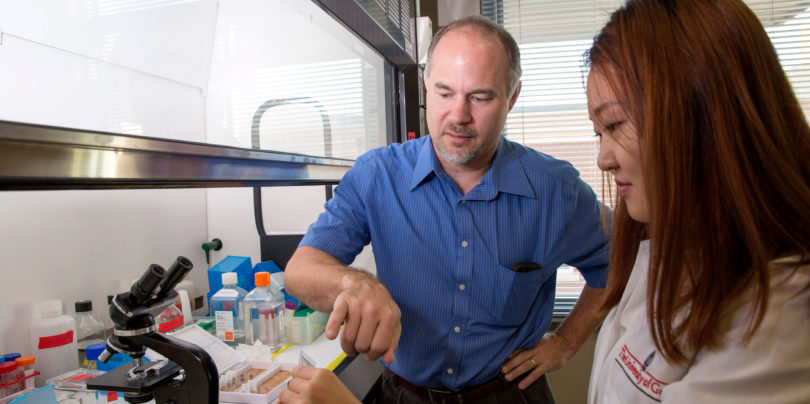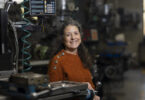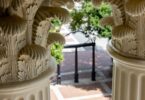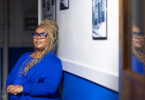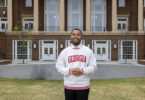Brian Cummings, an associate professor in the College of Pharmacy and director of the university’s Interdisciplinary Toxicology Program, has developed new drug delivery methods that target prostate cancer.
Where did you earn degrees and what are your current responsibilities at UGA?
I earned a double major in biochemistry and toxicology from Eastern Michigan University and a Ph.D. in pharmacology from Wayne State University. Currently, I am an associate professor in department of pharmaceutical and biomedical sciences in the College of Pharmacy. I am also the director of the Interdisciplinary Toxicology Program.
When did you come to UGA and what brought you here?
I started at UGA in August of 2003. Three things brought me here. One was the tremendous amount of growth that was ongoing in the department and college. Another was the Georgia Cancer Coalition. The final was the town of Athens, which both my wife and I felt would be perfect to raise our daughter.
What are your favorite courses and why?
“Pathophysiology.” Sometimes after I am explaining a disease and its symptoms, a student will come up and share a personal experience about a family member who had that disease, and how the lecture gave them some insight into what they were going through. I also enjoy teaching “Grantsmanship” because of the satisfaction I get watching a student’s writing improve throughout the semester. It’s great to see the positive effect that I am having on future scientists.
What interests you about your field?
I study metastatic prostate cancer, where there are few if any effective treatments. Like many people who study cancer, I had a family member die of this disease and that resulted in a certain amount of passion. What I enjoy about the cancer field is the multidisciplinary approach that researchers take. We have scientists working on areas such as bioengineering and diagnostic imaging, molecular mechanisms of action, drug discovery, and medicinal chemistry, among others. This lets me work with many different types of people who bring a different approach to a similar goal. It keeps me interested, as I am always learning new things.
What are some highlights of your career at UGA?
Receiving the Excellence in Undergraduate Research Mentoring Award from UGA’s Center for Undergraduate Research Opportunities (CURO) would be one. It also was an honor to be awarded the 2008 Teacher of the Year Award in the College of Pharmacy. Taking part in the Lilly Teaching Fellows Program was a transformative and awesome experience, as was becoming a member of the UGA Teaching Academy. On the research side, I would include designing and validating two novel lipid-based nanoparticles for the treatment of prostate cancer. Finally, receiving the 2016 American Society of Pharmacology and Therapeutics Toxicology Achievement Award.
How does your research or scholarship inspire your teaching, and vice versa?
I could not imagine just doing straight research without teaching. I also could not imagine only teaching. The two really fuel each other. I enjoy the historical perspective and foundational knowledge that teaching gives you. On the other hand, maintaining a research laboratory typically requires you to be at the forefront of your field and asking cutting edge questions, often using advanced methodology. This aids you in teaching students the most relevant and current information and helps you provide them with the tools to be successful in their future endeavors.
What do you hope students gain from their classroom experience with you?
I hope that they walk out the classroom every day having learned something new, and more importantly, the usefulness of this knowledge. I never want to have a student sitting in my class thinking “Why do I need to know this?” or “Why is this important to me?” It’s my job to design a lecture where those questions have obvious answers. This is one reason I tell students to stop me at any time and challenge me with these questions.
Describe your ideal student.
This is different for the classroom and the laboratory. My ideal classroom student is interactive, prepared and takes ownership of their education. They also have high expectations for themselves and their teacher. As a teacher, I always try to meet those expectations. I try to remember what it’s like being on the other side of podium and to see myself from the student’s perspective.
Teaching in the laboratory setting is sometimes not as appreciated by some as it should be; however, it is often in this setting where one gets the largest amount of satisfaction. The bonds that are created during a long-term research experience facilitate the transition from a simple teacher to a mentor, and can last long after the student has graduated. In this regard my ideal student in the laboratory is hardworking, inquisitive and able to set both short- and long-term goals. At the same time, I want students to question their results as well as me. Good things usually happen when my students prove me wrong. This takes perseverance on their part, and a lack of egotism on my part.
Favorite place to be/thing to do on campus is…
I enjoy running around campus, especially the intramural field trails around Lake Herrick in the fall when the marching band is practicing. I also like running the bridge overlooking Sanford Stadium and the sense of history I get running through North Campus when I think about the first students having classes under the trees. My absolutely favorite place to be on campus is with my family at Stegman Coliseum watching the Gym Dawgs.
Beyond the UGA campus, I like to…
I enjoy mountain biking. There are many outstanding trails around Athens, which is a fantastic biking community.
Community/civic involvement includes….
I work with the Athens Prostate Cancer Survivor’s Group, and my family volunteers at the Catholic Center at UGA, as well as the Athens Area Humane Society.
Favorite book/movie (and why)?
Favorite book is either “The Hobbit” or “The Dark Tower.” “The Hobbit” is such a quick and easy read that contains almost everything you would want in high fantasy. I read it several times when I was younger, but got back into it when my daughter discovered it. I had to buy us separate copies. “The Dark Tower” is almost the complete opposite. Not exactly high fantasy, and in no way a quick read, but nevertheless a culmination of over 20 years of writing and expectations, with an ending that while frustrating, may be the only ending possible (I am still debating with myself on this). My favorite movies are “Platoon” (to me basically Moby Dick meets the Vietnam War), “The Big Lebowski” (the Dude abides) and “The Christmas Story” (my wife won’t let me get the replica lamp).
Proudest moment at UGA?
I am tremendously proud of each of the graduate students who received their Ph.D. in my laboratory, as well as the undergraduate researchers who I helped earn their degrees. They remind me that no matter what else I do, I have helped others achieve their goals and go on to bigger and greater things as a UGA alumnus.
Is there anything else you’d like to add?
The best piece of advice I ever received was from a physical chemistry professor during my undergraduate years. When I told him I didn’t think I was good enough to get into a Ph.D. program, he chastised me for telling myself no. He said “Never tell yourself no. Let someone else tell you no, but at least you won’t be defeating yourself.” Basically, I took this to mean never tell yourself you are not good enough for something. There’s a very good chance I never would have gone to graduate school if I hadn’t gotten that advice.


